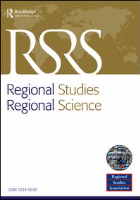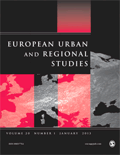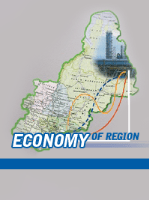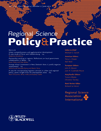
Regional Studies Regional Science
Scope & Guideline
Connecting Economic, Social, and Environmental Landscapes
Introduction
Aims and Scopes
- Regional Economic Development:
The journal emphasizes research on the dynamics of regional economic growth, innovation, and resilience, analyzing how local economies can adapt to global changes and crises. - Spatial Analysis and Geographic Information Systems (GIS):
A significant focus on spatial analysis techniques, including GIS, to visualize and interpret regional phenomena, helping researchers and policymakers understand complex spatial relationships. - Socio-economic Inequalities:
Exploring the causes and consequences of socio-economic disparities within and between regions, with a focus on vulnerable populations and marginalized communities. - Sustainability and Environmental Policy:
Research on sustainable development practices, climate change adaptation, and environmental governance at the regional level, addressing how regions can transition towards sustainable futures. - Digital Transformation and Innovation:
Studies on the impact of digital technologies on regional economies, including the role of digital skills in promoting industrial diversification and innovation.
Trending and Emerging
- COVID-19 Impact and Recovery:
A significant trend in recent research is the examination of the impacts of the COVID-19 pandemic on regional economies, including recovery strategies and long-term implications for regional resilience. - Digital Skills and Transformation:
There is a rising focus on the role of digital skills in regional diversification and economic transformation, reflecting the increasing importance of technology in shaping regional futures. - Climate Change Adaptation:
Emerging studies on climate change policies and their regional implications highlight the urgency of addressing environmental challenges and fostering sustainable development. - Narratives and Place-making:
Research emphasizing the role of narratives in regional development and identity formation is gaining prominence, showcasing how storytelling can influence policy and community engagement. - Social Vulnerability and Inclusion:
An increasing focus on social vulnerability and the need for inclusive growth strategies indicates a shift towards understanding and addressing inequalities within regions.
Declining or Waning
- Traditional Industrial Policies:
Research focusing on traditional industrial policies has diminished, possibly due to a shift towards more innovative and flexible approaches to regional development. - Conventional Economic Growth Metrics:
There is less emphasis on conventional economic growth metrics, suggesting a move towards more holistic measures of regional well-being that consider social, environmental, and economic factors. - Homogeneous Regional Strategies:
A waning interest in studies advocating for one-size-fits-all regional strategies indicates a growing recognition of the need for tailored approaches that consider unique regional contexts. - Passive Governance Models:
Research on passive or top-down governance models is declining, reflecting a trend towards examining participatory and collaborative governance approaches. - Short-term Economic Responses:
The frequency of studies focused on short-term economic responses to crises, such as immediate recovery strategies, has decreased in favor of long-term resilience and sustainability frameworks.
Similar Journals

PAPERS IN REGIONAL SCIENCE
Shaping the future of regional development through research.PAPERS IN REGIONAL SCIENCE, published by Wiley, is a leading international journal dedicated to advancing the understanding of regional science and interdisciplinary approaches to geography and environmental planning. With an impressive impact factor and a prestigious Q1 ranking in both Environmental Science and Geography, Planning and Development, this journal serves as a critical platform for disseminating high-quality research from 1955 to 2024. Covering a diverse scope including regional development, spatial analysis, and environmental issues, it facilitates discussion and knowledge exchange among scholars and practitioners. The journal is recognized for its rigorous peer-review process and its commitment to addressing pressing societal challenges through research. As a vital resource for researchers, professionals, and students alike, PAPERS IN REGIONAL SCIENCE fosters innovation and collaboration within the field, contributing to a deeper understanding of the complexities of regional systems.

Review of Regional Research-Jahrbuch fur Regionalwissenschaft
Connecting Scholars to the Heart of Regional ResearchReview of Regional Research-Jahrbuch fur Regionalwissenschaft, published by SPRINGER HEIDELBERG, is a pivotal academic journal dedicated to the interdisciplinary exploration of regional science, economics, and geographical studies. With a strong presence in Germany and an impressive range of topics, this journal serves as a vital platform for scholars, researchers, and practitioners aiming to advance knowledge in regional development and planning. The journal has achieved notable recognition, being categorized in the Q3 quartile in Economics and Econometrics and Q2 in both Geography, Planning and Development and Social Sciences (miscellaneous), highlighting its importance in contemporary academic discourse. The Scopus rankings further affirm its relevance, with an impressive percentile ranking across its categories. Although it operates under traditional access options, the journal's robust editorial oversight ensures high-quality research dissemination from 1998 through 2024, making it essential for anyone invested in the critical dynamics of regional studies.

EUROPEAN URBAN AND REGIONAL STUDIES
Transforming Urban Challenges into Research OpportunitiesEUROPEAN URBAN AND REGIONAL STUDIES is a premier journal dedicated to advancing the field of urban and regional studies, published by SAGE PUBLICATIONS LTD, a distinguished publisher renowned for its contributions to scholarly communications. Established in 1994 and running through 2024, this journal provides a vital platform for interdisciplinary research that addresses the complexities of urban environments and regional developments across Europe and beyond. It holds impressive distinctions, ranking in the Q1 category for both Environmental Science and Urban Studies in 2023, reflecting its strong impact and influence—ranked #31 out of 279 and #42 out of 219 in Scopus, respectively. Scholars and practitioners seeking to contribute to or stay informed on trends in sustainable urban development, policy-making, and regional planning will find this journal indispensable. Its contributions not only shed light on pressing urban issues but also cultivate a dialogue that bridges theory and practice. Enhance your understanding of contemporary urban challenges by engaging with the rich tapestry of research published in this esteemed journal.

Innovation and Development
Navigating the Complexities of Development Through InnovationInnovation and Development is a prestigious peer-reviewed journal published by Taylor & Francis Ltd, focusing on the dynamic interplay between innovation and socio-economic development. With an ISSN of 2157-930X and an E-ISSN of 2157-9318, this journal has made significant strides since its inception in 2015, covering a diverse range of disciplines including Cultural Studies, Development, Education, Geography, Planning and Development, and Political Science. Its impressive performance is reflected in its 2023 category quartiles, placing it in Q1 for Cultural Studies and ranking well within various other categories. The journal's robust Scopus rankings highlight its impact, with notable percentiles in key social science fields. Researchers and professionals engaged in the study of social innovation, policy development, and comparative cultural studies will find this journal invaluable as it aims to promote insightful discussions and share groundbreaking research that contribute to understanding the complexities of innovation in a globalized context. Available through various access options, Innovation and Development seeks to foster an interdisciplinary approach to address pressing challenges in today's society.

Regional Statistics
Exploring the Quantitative Dimensions of SocietyRegional Statistics, published by the Hungarian Central Statistical Office, is a leading scholarly journal that plays a pivotal role in enhancing the understanding of regional development and statistical analysis. With its ISSN 2063-9538 and E-ISSN 2064-8243, this open-access journal contributes significantly to various fields, including Cultural Studies, Economics, Geography, and Public Administration. The journal has established itself with impressive Scopus rankings, placing it in the top percentiles across multiple categories, evidencing its high-quality research outputs. Covering converged years from 2015 to 2024, Regional Statistics publishes insightful articles that address pressing regional issues, making it an invaluable resource for researchers, professionals, and students alike who are interested in the quantitative dimensions of society. With a reputation bolstered by its Q1 and Q2 categorizations in various disciplines, this journal is not only committed to advancing statistical knowledge but also to fostering interdisciplinary dialogue among statisticians, policymakers, and social scientists.

Geoadria
Empowering Scholars with Cutting-Edge ResearchGeoadria, an esteemed Open Access journal published by the University of Zadar in Croatia, has been at the forefront of disseminating valuable research since its inception in 1996. With a keen focus on atmospheric science, demography, earth-surface processes, and geography, this journal serves as a crucial platform for researchers and professionals aiming to explore the intricate relationships between these fields. Although it currently holds a Q4 quartile ranking in various categories, such as Atmospheric Science and Geography, its commitment to promoting innovative scholarly dialogue ensures its relevance and utility within the academic community. Geoadria is indexed in Scopus, with rankings that reflect its ongoing contribution to the social sciences and earth sciences, notably garnering attention in niche areas. With a dedication to open access since 1996, the journal stands as a testament to the University of Zadar's commitment to enhancing global knowledge. Researchers, professionals, and students interested in geography, demography, and environmental sciences will find Geoadria a vital resource for the latest empirical studies and theoretical discussions.

Economy of Region
Connecting Scholars to Shape the Future of Regional EconomiesEconomy of Region is a distinguished peer-reviewed journal dedicated to advancing research and discourse in the fields of economics, business management, and environmental science. Published by the Russian Academy of Sciences, Ural Branch, Institute of Economics, this open-access journal has been expanding its reach since 2005, offering invaluable insights and fostering academic collaboration on both a national and international scale. With an impressive blend of research focus areas, it has secured notable rankings, including Q2 in Economics and Q3 in Business and Environmental Science for 2023, reflecting its commitment to quality and impact within these domains. Economy of Region presents a critical platform for scholars, professionals, and students to engage with contemporary economic issues while contributing to the ongoing development of pertinent knowledge in the field. Researchers are encouraged to submit original works that explore intricate economic landscapes, thereby enhancing the journal's contribution to academia and practice.

TIJDSCHRIFT VOOR ECONOMISCHE EN SOCIALE GEOGRAFIE
Exploring the Nexus of Economics and Social GeographyTIJDSCHRIFT VOOR ECONOMISCHE EN SOCIALE GEOGRAFIE, an esteemed journal published by WILEY, provides a premier platform for the dissemination of cutting-edge research within the fields of economics and social geography. With an ISSN of 0040-747X and an E-ISSN of 1467-9663, this journal has established itself as a pivotal resource, exhibiting a remarkable Q1 ranking in both Economics and Econometrics as well as Geography, Planning and Development for 2023. Notably, it is positioned in the 95th percentile among 821 journals in its category of Social Sciences, and ranks 46th among 716 in Economics and Econometrics, underscoring its influential role in shaping academic discourse. The journal, which has been in publication since 1967 and is anticipated to run through 2024, invites contributions that explore the intricate interplay between economic phenomena and social geospatial dynamics. Researchers, professionals, and students are encouraged to engage with its findings, which are crucial for understanding contemporary socio-economic challenges and innovations on a global scale.

Regional Science Policy and Practice
Exploring the dynamics of regional science and policy.Regional Science Policy and Practice is a premier academic journal published by WILEY, focusing on the interconnections between regional science, policy development, and practical implementation in diverse contexts. With an ISSN of 1757-7802, this journal has established its reputation through rigorous research, sitting in the prestigious Q2 quartile across several categories, including Development, Geography, Planning and Development, as well as Management, Monitoring, Policy, and Law. Its commitment to advancing knowledge in regional development is reflected in its notable Scopus rankings, where it holds the 90th rank in Development and maintains a solid presence in Geography and Environmental Science. Although not an open-access journal, Regional Science Policy and Practice serves as a vital resource for researchers, professionals, and students keen on understanding and shaping the dynamics of regional policies and practices from 2008 to 2024 and beyond. Based in the United States, this journal encourages submissions that illuminate theoretical frameworks, empirical studies, and policy reviews, aiming to enhance the understanding and practice of regional science on a global scale.

ANNALS OF REGIONAL SCIENCE
Connecting Research with Policy in Regional ScienceThe ANNALS OF REGIONAL SCIENCE, published by SPRINGER, is a premier academic journal that has been disseminating impactful research since its establishment in 1967. With a distinguished focus on regional science, this journal serves as a vital platform for scholars, policymakers, and practitioners interested in understanding the spatial dynamics of economic and environmental phenomena. Boasting a Q1 ranking in Social Sciences and a Q2 ranking in Environmental Science, the journal effectively bridges disciplines, fostering interdisciplinary dialogue and innovation. The journal's rigorous peer-review process ensures the highest standards of academic integrity, making it a crucial resource for anyone involved in regional analysis and planning. As a testament to its global relevance, the ANNALS OF REGIONAL SCIENCE is indexed in Scopus, placing it among the top-tier journals in its field, with a commendable rank of #61 out of 275 in General Social Sciences and #100 out of 233 in General Environmental Science. Researchers, professionals, and students are encouraged to contribute to this essential body of work, as it continues to shape the discourse on regional development and environmental sustainability.